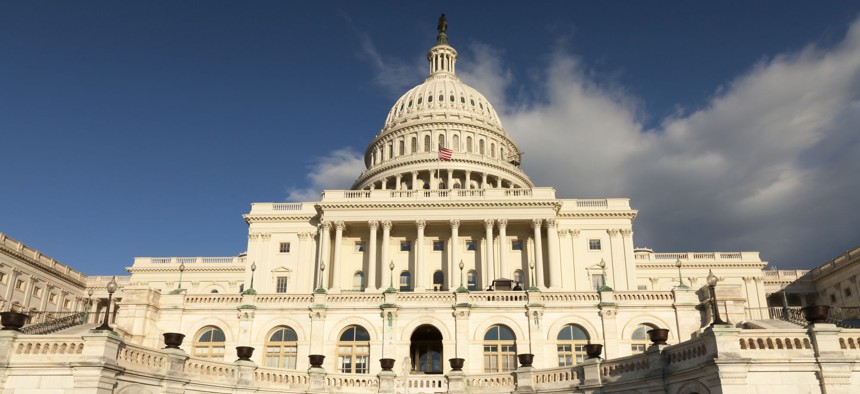Connecting state and local government leaders
At an Infrastructure Week discussion, leaders from around the country touted benefits, they say, the income tax exemption for municipal bonds provides for their jurisdictions.
WASHINGTON — Highlighting projects that ranged from schools in Virginia to street upgrades meant to help drive economic development in Oklahoma, a panel of state and local leaders here Thursday stressed the importance of the federal tax exemption for municipal bonds.
“If you make financing more expensive, then you will get less infrastructure,” said Hans Riemer, a councilmember from Montgomery County, Maryland. “If the tax benefits change for municipal financing,” he added, “we won’t be able to build as many schools, roads, parks, libraries.”
The “muni” bond tax exemption means investors avoid paying federal income taxes on interest they earn from the bonds. It’s believed to keep borrowing costs for municipal bonds lower compared to other forms of financing.
There’s not an imminent push to kill the tax break. President Obama’s final budget proposal includes new restrictions on it. But Republicans in Congress have snubbed the president’s latest spending plan. Various other proposals to rein in the exemption have kicked around Washington in recent years. The primary argument against the exemption is that it costs the federal government money in forgone revenues, while mainly benefiting wealthy investors.
But the perspective from the local level can differ. Craig Thurmond, mayor of Broken Arrow, Oklahoma, also took part in Thursday’s panel, which was held as part of Infrastructure Week.
Broken Arrow is the Sooner State’s fourth most-populous city, with about 104,000 residents, according to the most recent U.S. Census Bureau estimates.
Maintaining and beefing up infrastructure, Thurmond explained, has been crucial in retaining a number of companies in the city, including one that provides aviation training services and simulators, and another that makes tactical law enforcement and military gear.
It was also an important element in revitalizing the city’s Rose District—a part of town where, people would say just a few years ago, that if there was a car left there at night, it was because it would not start. These days it’s tough to find parking at times in the district.
“We could do very little, or a lot less, if we didn’t have tax exempt bonds,” Thurmond said.
A white paper the International City / County Management Association and the Government Finance Officers Association published last year looked at what would happen if the muni bond tax break were cut or curtailed. Among the findings: without the exemption in place, state and local governments would have paid about $714 billion in additional interest from 2000 to 2014.
In Chesterfield County, Virginia, in 2013, voters approved a $304 million bond measure for the replacement and renovation of 10 older schools. “We are working diligently to get that work done in seven years,” Dr. Sheryl Bailey, the county’s deputy administrator for management services, said during Thursday’s panel discussion. “Tax exempt municipal bonds are a key tool for us to be able to afford to renovate and replace those older schools.”
“If the financing costs went up, then the implementation timetable would extend to well past ten years,” she added, noting the schools getting upgraded were about 50 to 60 years old.
Thursday’s discussion was held on Capitol Hill. It was organized by a coalition of state and local government groups, including the National League of Cities, the National Association of Counties, the International City / County Management Association and others.
In addition to discussing the importance of the municipal bond tax exemption, participants emphasized the need for federal cooperation in funding and financing infrastructure.
“We need a strong federal partner,” said Montgomery County’s Riemer. Without robust support from Uncle Sam, he said, localities, “wouldn’t have the ability to dream big, about really big infrastructure. You’d get a lot of, you know, widening of an intersection here or there at the local level, but you wouldn’t get projects that can move 50,000 and 75,000 people a day.”
Lawmakers in Washington state last year approved a $16 billion transportation package that includes a gas tax hike. That happened prior to the enactment of the so-called FAST Act, a significant piece of five-year federal transportation legislation, which funnels infrastructure money to the states—at least through 2020, when it will lapse.
“We’re very proud of the fact that we actually got this passed before we knew there was going to be any federal dollars,” said state Rep. Judy Clibborn, a Democrat who chairs the House Transportation Committee, and represents a district east of Seattle. “We were shocked to have the federal government actually come forward,” she added. “That is just gravy for us.”
U.S. Rep. Earl Blumenauer, an Oregon Democrat who serves on the House Ways and Means Committee also made an appearance Thursday. Sporting a neon green bicycle-shaped button on his suit jacket lapel, Blumenauer acknowledged some of the challenges that surround federal transportation infrastructure funding, which now relies heavily on waning fuel taxes.
“Don’t give up on the federal government for being a partner in the resources,” Blumenauer said to the state and local officials present. “This has been something that has been part of the history of infrastructure in this country, back with Benjamin Franklin’s postal roads, or Abraham Lincoln’s transcontinental railroad, Eisenhower’s interstate freeway system.”
Those were undertakings, the congressman said, that exemplify “the federal government driving technology and investment that led to tremendous prosperity, tying the country together.” He added: “The federal government has a role to play going forward.”
Bill Lucia is a Reporter for Government Executive’s Route Fifty.

NEXT STORY: Tips for controlling cloud migration costs




